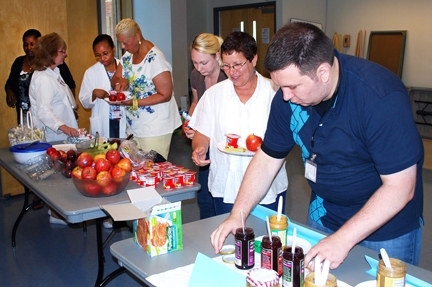Most of us know you're supposed to eat a healthy breakfast, and you'd think that people who work in the medical field would know all about the benefits of a morning meal. But sometimes you have to feel it to believe it.
That's why staff members in Community Wellness at MIT Medical recently ran a healthy breakfast program for their fellow MIT Medical employees — and the results were sometimes surprising.
During the seven-day Breakfast Challenge (modeled on a similar 21-day program for students), participants had a healthy breakfast every day and recorded what they ate. Those who ate breakfasts that included a protein and a whole grain for seven consecutive days were entered into a drawing to win an Amazon.com gift card. Participants got encouragement in the form of free food and in-person advice every weekday morning, as well as tips on planning healthy breakfasts (more information on eating healthfully is available on the Community Wellness website).
“I was pleasantly surprised by how much people wanted to talk about breakfast and what they were eating, and to learn about healthy options,” said Julie Banda, program manager in Community Wellness (formerly the Center for Health Promotion & Wellness) who developed the idea for the Breakfast Challenge with her colleague Susanna Barry. “I’d half-expected people to drop by, grab some food and leave. It was amazing how much of a bonding experience it wound up being. I’d never met that many people in MIT Medical before.”
Banda and Barry estimated that about 100 people showed up for free breakfast and advice each morning, or roughly one-third of the 274 full-time employees at MIT Medical.
“Many, many people said they loved the opportunity to try new foods for breakfast,” Barry said.
One of those people was Bob Bright, MIT Medical’s facilities manager. “I found that by adding some protein to my breakfast, I felt less hungry throughout the day,” he said. “I’m having cheese sticks regularly now.” He also enjoyed adding peanut butter to the whole-grain toast or bagel he normally ate.
For the Community Wellness staff, the breakfast challenge offered another kind of educational opportunity for their colleagues. “People inside MIT Medical could see and experience what we do in our group and get the same benefits as the rest of the people on campus we work with every day,” Banda said.
“We have a passion for what we do, and we were excited to share it with our colleagues,” Barry added.
Breakfast Challenges for students are periodically offered during the academic year and also as part of “Upgrade Your Health and Happiness” class at DAPER, which Banda and Barry designed.
That's why staff members in Community Wellness at MIT Medical recently ran a healthy breakfast program for their fellow MIT Medical employees — and the results were sometimes surprising.
During the seven-day Breakfast Challenge (modeled on a similar 21-day program for students), participants had a healthy breakfast every day and recorded what they ate. Those who ate breakfasts that included a protein and a whole grain for seven consecutive days were entered into a drawing to win an Amazon.com gift card. Participants got encouragement in the form of free food and in-person advice every weekday morning, as well as tips on planning healthy breakfasts (more information on eating healthfully is available on the Community Wellness website).
“I was pleasantly surprised by how much people wanted to talk about breakfast and what they were eating, and to learn about healthy options,” said Julie Banda, program manager in Community Wellness (formerly the Center for Health Promotion & Wellness) who developed the idea for the Breakfast Challenge with her colleague Susanna Barry. “I’d half-expected people to drop by, grab some food and leave. It was amazing how much of a bonding experience it wound up being. I’d never met that many people in MIT Medical before.”
Banda and Barry estimated that about 100 people showed up for free breakfast and advice each morning, or roughly one-third of the 274 full-time employees at MIT Medical.
“Many, many people said they loved the opportunity to try new foods for breakfast,” Barry said.
One of those people was Bob Bright, MIT Medical’s facilities manager. “I found that by adding some protein to my breakfast, I felt less hungry throughout the day,” he said. “I’m having cheese sticks regularly now.” He also enjoyed adding peanut butter to the whole-grain toast or bagel he normally ate.
For the Community Wellness staff, the breakfast challenge offered another kind of educational opportunity for their colleagues. “People inside MIT Medical could see and experience what we do in our group and get the same benefits as the rest of the people on campus we work with every day,” Banda said.
“We have a passion for what we do, and we were excited to share it with our colleagues,” Barry added.
Breakfast Challenges for students are periodically offered during the academic year and also as part of “Upgrade Your Health and Happiness” class at DAPER, which Banda and Barry designed.






